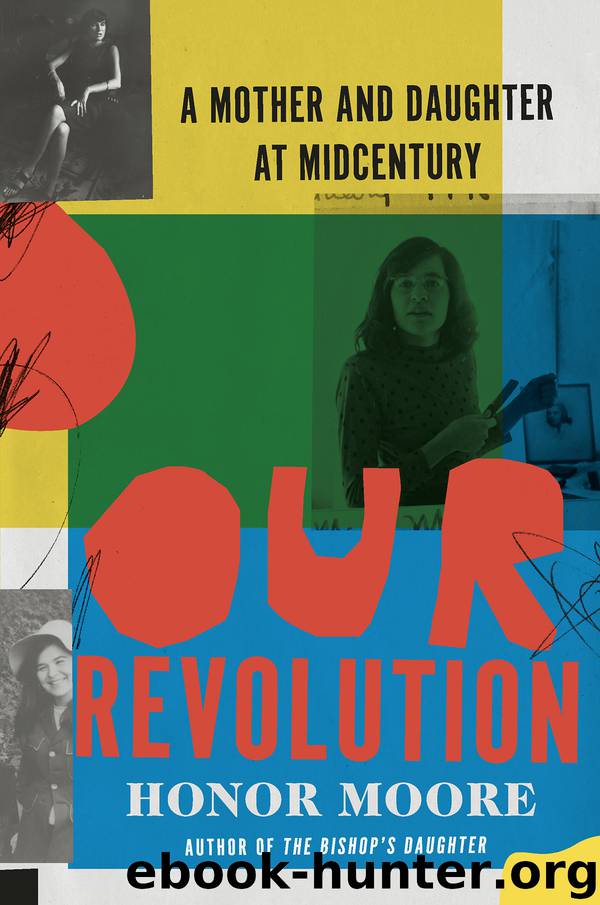Our Revolution by Honor Moore

Author:Honor Moore
Language: eng
Format: epub
Publisher: W. W. Norton & Company
Published: 2020-02-04T16:00:00+00:00
Laurie, the vicar, was now driving me through the city. “Mrs. Skipper doesn’t go out any more, she was saying, and she insisted you come over. She has stories.” I didn’t really remember Mrs. Skipper, only all her daughters. “Stories about your mother,” Laurie says; “and they’ve invited you to lunch.” The Skippers, it turned out, had lived across the street and down the block on Second Street—a family of four girls and one boy named James. Susan Skipper and I were in the same Sunday school class, and I remembered that Geneva, the oldest, had died young, in the 1970s. Joyce, the second oldest, answered the door, her daughters and granddaughters crowded behind her. The Skippers own the house, and Mr. and Mrs. Skipper live on the second floor, which functions as a kind of round-the-clock care facility—Joyce had a career as a nurse.
We sat down in the living room, in a circle—Laurie and I, the Skipper sisters including Stella, who walked me to school. I remember that Joyce was best at double Dutch, or was that Susan? And that Susan and Joyce looked alike, but now Susan wears glasses and is much taller than Joyce. “Would you like some cake?” someone asks, and then, suddenly with what feels like a flourish, one of Joyce’s daughters wheels in her grandmother, Catherine Skipper, who is ninety-five years old—the matriarch. No matter that she’s bedridden, she is a woman of enormous power, wiry, with gray hair and warm, light golden brown, very youthful skin. She starts right in.
When they first moved to Second Street, she had watched white boys play and break windows; “I was always looking out the window,” she said, and then one Sunday, she saw people, even colored people, dressed up and saw “they go to that church down there,” and her husband said to her, “they even wear suits.” So she dressed up her kids. “I only had three then, but I couldn’t dress them. Salvation, here I come!” She went to the Salvation Army, the thrift stores, and told the kids the clothes were from Best and Lord and Taylor, and so the family joined “Grace.”
“She’d come over here, your mother, a baby under one arm, a cabbage in the other—those cabbages were as big as a child—they must have been from the farm.” She meant Hollow Hill; Gami had “supplies” delivered twice a week.
“The first day she came, I remember it. I was washing clothes in the tub when the doorbell rang and it was Mrs. Moore calling.” There was a huge pile of laundry by the tub—“Your mother was … horrified.”
“Are you going to wash all of them by hand?”
“Yes yes I am but he helps”—her husband, who worked at the steel mill.
She’d come north at six years old, the year “things began to go bad in 1915.” Her family was from Orangeburg, South Carolina.” Her father had been a sergeant in World War I, the 369th; he had fought in France, returned home, and become a longshoreman in Jersey City.
Download
This site does not store any files on its server. We only index and link to content provided by other sites. Please contact the content providers to delete copyright contents if any and email us, we'll remove relevant links or contents immediately.
| Africa | Asia |
| Canadian | Europe |
| Holocaust | Latin America |
| Middle East | United States |
Fanny Burney by Claire Harman(26602)
Empire of the Sikhs by Patwant Singh(23084)
Out of India by Michael Foss(16853)
Leonardo da Vinci by Walter Isaacson(13336)
Small Great Things by Jodi Picoult(7140)
The Six Wives Of Henry VIII (WOMEN IN HISTORY) by Fraser Antonia(5515)
The Wind in My Hair by Masih Alinejad(5095)
A Higher Loyalty: Truth, Lies, and Leadership by James Comey(4962)
The Crown by Robert Lacey(4814)
The Lonely City by Olivia Laing(4801)
Millionaire: The Philanderer, Gambler, and Duelist Who Invented Modern Finance by Janet Gleeson(4478)
The Iron Duke by The Iron Duke(4354)
Papillon (English) by Henri Charrière(4274)
Sticky Fingers by Joe Hagan(4198)
Joan of Arc by Mary Gordon(4109)
Alive: The Story of the Andes Survivors by Piers Paul Read(4031)
Stalin by Stephen Kotkin(3965)
Aleister Crowley: The Biography by Tobias Churton(3640)
Ants Among Elephants by Sujatha Gidla(3467)
